
Goodbye, Mr. Chips is a novella about the life of a school teacher, Mr. Chipping, written by English writer James Hilton and first published by Hodder & Stoughton in October 1934. It has been adapted into two feature films and two television presentations.
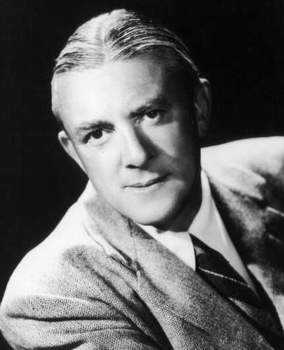
James Hilton was an English novelist and screenwriter. He is best remembered for his novels Lost Horizon, Goodbye, Mr. Chips and Random Harvest, as well as co-writing screenplays for the films Camille (1936) and Mrs. Miniver (1942), the latter earning him an Academy Award.
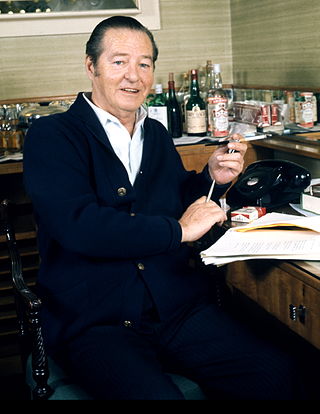
Sir Terence Mervyn Rattigan was a British dramatist and screenwriter. He was one of England's most popular mid-20th-century dramatists. His plays are typically set in an upper-middle-class background. He wrote The Winslow Boy (1946), The Browning Version (1948), The Deep Blue Sea (1952) and Separate Tables (1954), among many others.

Sir Alexander Korda was a Hungarian–born British film director, producer, and screenwriter, who founded his own film production studios and film distribution company.

Sir Guy of Gisbourne is a character from the Robin Hood legends of English folklore. He first appears in "Robin Hood and Guy of Gisborne", where he is an assassin who attempts to kill Robin Hood but is killed by him. In later depictions, he has become a romantic rival to Robin Hood for Maid Marian's love.

Marie Adelaide Elizabeth Rayner Lowndes, who wrote as Marie Belloc Lowndes, was a prolific English novelist, and sister of author Hilaire Belloc.

Edward Hilton Young, 1st Baron Kennet, was a British politician and writer.
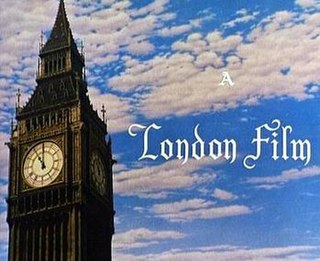
London Films Productions is a British film and television production company founded in 1932 by Alexander Korda and from 1936 based at Denham Film Studios in Buckinghamshire, near London. The company's productions included The Private Life of Henry VIII (1933), Things to Come (1936), Rembrandt (1936), and The Four Feathers (1939). The facility at Denham was taken over in 1939 by Rank and merged with Pinewood to form D & P Studios. The outbreak of war necessitated that The Thief of Bagdad (1940) be completed in California, although Korda's handful of American-made films still displayed Big Ben as their opening corporate logo.

George Warwick Deeping was an English novelist and short story writer, whose best-known novel was Sorrell and Son (1925).
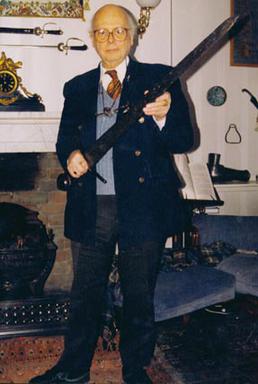
Ronald Ewart Oakeshott was a British illustrator, collector, and amateur historian who wrote prodigiously on medieval arms and armour. He was a Fellow of the Society of Antiquaries, a Founder Member of the Arms and Armour Society, and the Founder of the Oakeshott Institute. He created a classification system of the medieval sword, the Oakeshott typology, a systematic organization of medieval weaponry.

Sir John Selby Clements, CBE was a British actor and producer who worked in theatre, television and film.

Guy Rolfe was a British actor.

Knight Without Armour is a 1937 British historical drama film starring Marlene Dietrich and Robert Donat. It was directed by Jacques Feyder and produced by Alexander Korda from a screenplay by Lajos Bíró adapted by Frances Marion from the 1933 novel by James Hilton. The novel was published in the United States as Without Armour. The music score was by Miklós Rózsa, his first for a motion picture, using additional music by Tchaikovsky.
Robert Westerby, was a writer of novels and screenwriter for films and television. An amateur boxer in his youth, he wrote many early magazine articles and stories centred around that sport. As a writer of screenplays, he was employed at Disney's Burbank studio from 1961 until his death in 1968.

James Usselman, known professionally as James Carew, was an American actor who appeared in many films, mainly in Britain. He was born in Goshen, Indiana in 1876 and began work as a clerk in a publishing firm. He began acting on stage in Chicago in 1897 in Damon and Pythias.
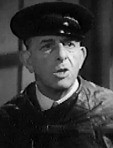
Herbert Lomas was a British actor who appeared in more than forty films in a career lasting between 1931 and 1955. He was born in Burnley, Lancashire and made his first film appearance in an early sound version of Hobson's Choice (1931).
King of the Wind is a 1990 British adventure film directed by Peter Duffell and starring Richard Harris, Glenda Jackson and Frank Finlay. It is based on the novel King of the Wind by Marguerite Henry. The film depicts the life of the Godolphin Arabian, an Arab colt in 18th-century Kingdom of Great Britain.
Gertrude Helena Bone, Lady Bone was a British writer who published during the Edwardian era. She wrote short stories, three novels, and several illustrated collections.
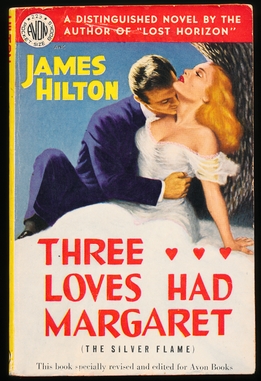
The Silver Flame is a 1928 novel by the British writer James Hilton. The original British publisher was Butterworth. In 1949 it was published in the United States in by Avon under the alternative title Three Loves Had Margaret. It has been described as the last of his "apprentice novels" before he emerged as a major international author. The story takes place on a Cotswold estate between 1896 and 1926.

Morning Journey is a 1951 novel by the British writer James Hilton. It was published in London by Macmillan and in New York by Little, Brown and Company. It received positive reviews on its release and was influenced by Hilton's own time in Hollywood as a screenwriter. It was Hilton's penultimate novel, followed by Time and Time Again in 1953.

















